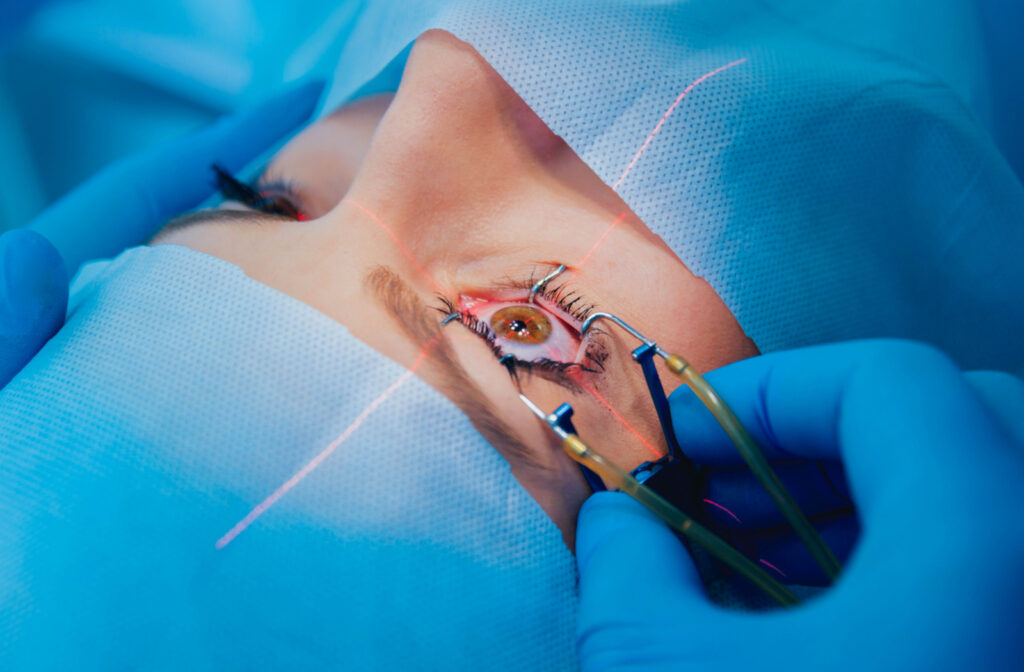LASIK eye surgery reshapes the front surface of your eye to correct a refractive error. With LASIK eye surgery, many people can achieve 20/20 vision without needing prescription eyewear.
If you’ve ever considered laser eye surgery, chances are you’ve pondered over many questions. For example, how long does the surgery last?
The timing of LASIK eye surgery can vary from person to person but generally takes 30 minutes or less. Your eye doctor can perform an eye exam to assess whether you’re a candidate for laser eye surgery.
What Is LASIK Eye Surgery?
LASIK (laser-assisted in situ keratomileusis) is a commonly performed procedure for vision correction and an alternative to wearing eyeglasses and contact lenses. It uses a highly specialized laser to reshape an irregular cornea (transparent outer layer of the eye) to alter how light enters the eye and focuses on the retina (the light-sensitive tissue at the back of the eye) to improve vision clarity.
LASIK eye surgery can correct vision problems or refractive errors, notably nearsightedness (myopia), farsightedness (hyperopia), and astigmatism, reducing or eliminating the need for glasses or contact lenses. Imagine waking up in the morning and seeing the world with clear vision. No more fumbling for glasses on your bedside table or navigating the intricacies of inserting contact lenses.
Who Is a Candidate for LASIK?
Not everyone is a candidate for LASIK eye surgery, and a thorough examination by your eye doctor is crucial to determine eligibility. Generally, suitable candidates include individuals who:
- Have a stable vision prescription
- Have good overall eye health
- Are 18 years and older
- Have realistic expectations about the outcomes of the procedure
- Do not have certain medical conditions
- Are not on medications that can affect healing
Before LASIK Eye Surgery
To determine eligibility for LASIK, your eye doctor will assess your eye health, examine your cornea, and evaluate your risk. They may even ask you to stop wearing contact lenses for some time before your scheduled surgery and wear glasses instead.
LASIK Eye Surgery Procedure
If you need eye surgery in both eyes, your doctor will usually do them together. LASIK eye surgery procedure starts with medication to help you relax and administer numbing eye drops. After numbing takes effect, an instrument is used to help keep the eyes open for the procedure.
The eye doctor then creates a thin, hinged flap in the cornea with a microkeratome blade or laser keratome. After lifting the flap, a laser reshapes the cornea, which can involve the removal of corneal tissue. The flap gets repositioned onto the cornea without needing stitches. A shield or eye patch placed over the eyes helps protect the eyes while they heal.
How Long Does a LASIK Procedure Last?
Pre-op preparations, such as paperwork and a final consultation with your eye doctor, including post-op rest, can take time. But, the LASIK procedure is surprisingly swift and can take 30 minutes or less.
After LASIK Eye Surgery
Post-procedure, your eyes may experience mild discomfort, irritation, burning, or the feeling that something is in your eyes. These symptoms, including blurry vision, watery eyes, and mild pain, will improve within the first few days after surgery.
Most individuals find that their vision improves significantly within the first 24 to 48 hours when they go for a follow-up appointment with their eye doctor. Your eye doctor may provide a mild pain reliever and an eye shield to stop any instinct to rub your eyes, as rubbing can dislodge the flap.
Following your doctor’s post-operative care instructions, such as using eye drops to reduce inflammation and prevent infection, can help support the recovery process. Over the next few weeks, you’ll likely notice a progressive improvement in your vision as your eyes heal.
Full visual stabilization may take a few months, during which regular follow-up appointments with your eye doctor will monitor your progress. However, contact your eye doctor immediately if you experience pain or unusual or worsening symptoms.
Vision After LASIK Eye Surgery
LASIK eye surgery has many benefits but can vary in individuals. Many people achieve 20/20 vision. However, some individuals may still need prescription eyewear, though at a lower level than before surgery.
Speak to your eye doctor about complications or risks of LASIK eye surgery. Some people, usually a small percentage, may experience a regression in their vision correction. This regression may occur months or years after the surgery. A ‘touch up’ or LASIK enhancement can help achieve vision correction in this case.
Find Out If LASIK Is Right for You
Although LASIK eye surgery is a life-changing procedure that offers the possibility of clear and crisp vision, it’s vital to consider all the factors that come along with it. If you are considering LASIK as an alternative to wearing glasses or contacts and want to pursue an active lifestyle without relying on vision aids, book an appointment with Restore Vision Center.
Our eye doctors can help you make an informed decision about your vision care by discussing LASIK and determining if you are a candidate.



